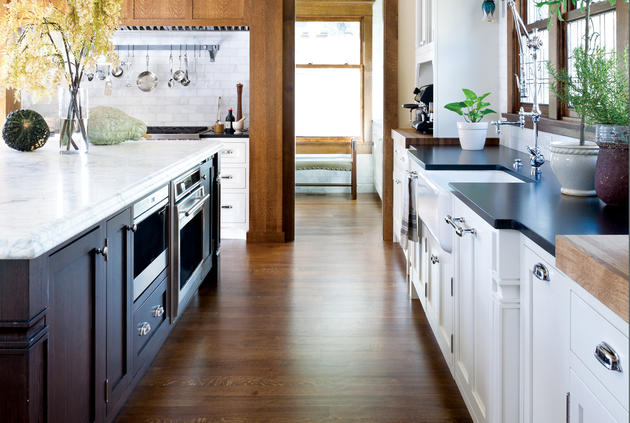
Your Guide to Choosing a Countertop Material
Denver’s top kitchen-design experts on finding countertops to match your look and lifestyle.

1. Engineered Quartz
Pros: Twice as strong as granite, this synthetic natural-stone look-alike resists stains, scratches, and heat with no sealing required. Look for brand names Caesarstone, Cambria, and Silestone.
Cons: It can chip. Corners are especially vulnerable, so opt for rounded or chamfered edges.
Style Match: A top choice for contemporary kitchens, its clean look pairs especially well with modern European cabinetry.
Installed Price Per Square Foot (PPSF): $85 to $150
Tip: “The impermeability of the material makes it a good choice for any wet area,” says William Landeros, showroom director and designer for Bulthaup by Kitchen Distributors.
2. Wood
Pros: Durable and hygienic (when sealed properly), wood lends a warm look.
Cons: “Here in the Rockies, solid wood tops tend to warp or even separate,” Landeros warns. “Butcher blocks require constant high humidity and must be oiled or treated with a moisturizing cream.” Nicks and scratches are inevitable, and you’ll need a trivet for hot pans.
Style Match: “Any area where you want to get away from a more sterile, clean look,” Landeros says—think seating areas, buffets, benches, and desks.
Installed PPSF: $85 to $130
Tip: Look for a warranty that covers warping and splitting. “I’ve found Spekva material to be very stable,” Landeros says.
3. Stainless Steel
Pros: Heat, stains, and bacteria are no match for this ultra-durable material.
Cons: “Clients are occasionally put off by the scratching that occurs, though after a few months, the scratches even out to a nice patina,” says Mike Smith, technical designer for Studio Como.
Style Match: Its modern-industrial look is a natural complement to streamlined cabinets, but it also looks cool with rustic reclaimed wood.
Installed PPSF: $85 to $150
Tip: Rather than waiting for scratches to appear, take a cue from some of Smith’s clients and scrub your new countertop with steel wool on day one.
4. Glass
Pros: It’s almost as hygienic and stain-resistant as stainless steel but has many more design and color options. With some basic care, it’ll look like new for years.
Cons: This pricey choice shows fingerprints, and cracks and scratches are a possibility.
Style Match: Ideal for modern kitchens. Pair with glossy lacquered cabinetry for a super-streamlined look.
Installed PPSF: $65 to $300
Tip: “It’s worth getting a sample of any glass you’re considering and using it as a trivet to see how it withstands heat—as not all glass is created equal,” Smith says.
5. Quartzite
Pros: The beauty of marble without the worry: Harder than granite, quartzite shrugs off moisture, heat, scratches, and stains.
Cons: “It’s the most unique choice, but also the most expensive,” says Mikal Otten, owner of Exquisite Kitchen Design (EKD). Its density makes decorative edges a challenge.
Style Match: The white to gray stone (also comes in tan, taupe, and green) lends an elegant look to transitional kitchens.
Installed PPSF: $175 to $275
Tip: If you have high ceilings, a thick slab will look better proportionally, says Otten. Find a good stone fabricator who can do a mitered edge treatment to give your slab the illusion of thickness.

6. Granite
Pros: It’s tough as nails and offers nearly limitless design possibilities.
Cons: You’ll need to seal it every few years to prevent stains, and the look can easily get too busy.
Style Match: “Modern to traditional and everything in between,” says Angela Otten, kitchen designer for William Ohs Showrooms.
Installed PPSF: $50 to $200
Tip: Ask about granite’s different texture treatments (from caress or flame to leathered or honed) to achieve different design goals, Angela Otten suggests.
7. Marble
Pros: Marble has a classic look that will stand the test of time.
Cons: The porous material is prone to etches and scratches. New sealants make staining less of a problem, but acidic foods will etch the surface.
Style Match: A no-brainer for traditional spaces, marble can go glam, too. EKD’s Mikal Otten likes it on wall surfaces or covering hood elements.
Installed PPSF: $150 to $250
Tip: “A honed or leathered finish helps hide etching,” Mikal Otten says.
8. Soapstone
Pros: Resists stains and bacteria (no chemical sealers required) and has a unique ability to absorb heat.
Cons: Soapstone is relatively soft (it’s composed mostly of talc), so edges may get dinged or chipped. Regular maintenance with oil is required and will soften the appearance of scratches.
Style Match: Typically specified for a more traditional setting, soapstone has “a very specific look—typically dark green to black tones,” Angela Otten says. “It works well when paired with wood tops and looks amazing with white painted cabinets.”
Installed PPSF: $70 to $130
Tip: “Because soapstone is soft, it can be carved into sinks,” Angela Otten says.
Courtesy of 5280 Magazine
By Christine Deluca